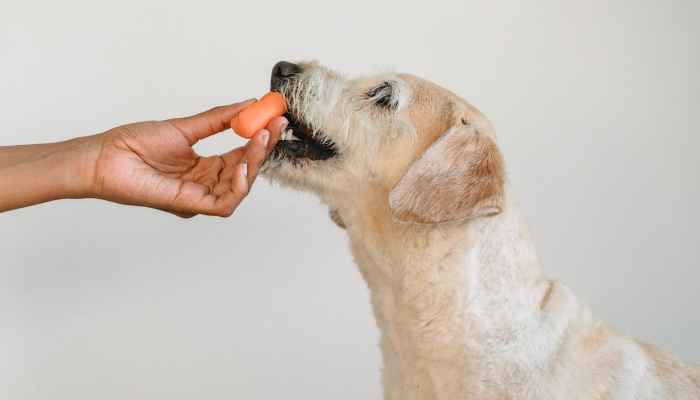We all want to provide our animal friends the best care possible as pet owners. Making sure that our dogs eat properly is one of the most crucial parts of dog care for preserving a dog’s health. The balance of necessary nutrients is the most crucial factor to take into account when it comes to feeding your. These include protein, fat, carbohydrates, vitamins, and minerals. Each of these nutrients plays a specific role in maintaining the health of dogs and is essential for proper growth, development, and overall health.
Protein
Protein is an essential nutrient for dogs for building and repairing muscle tissue, maintaining healthy skin, hair, and nails, and for supporting the overall health and well-being. When it comes to feeding, protein should be the primary source of nutrition. Good sources of protein include lean meats such as chicken, fish, and beef, as well as eggs. Please note that not all proteins are created equal, and the quality of protein can vary depending on the source. For example, animal-based proteins are considered to be of higher quality than plant-based proteins, however recent studies show that vegan based dog foods are also good. Also note the specific protein requirements for your dog based on their size, breed, and activity level. Puppies and growing dogs have higher protein requirements than adult dogs, as do working and performance dogs. Senior dogs may also have different requirements than adult dogs.
When selecting a commercial dog food, be sure to check the protein content and ingredient list. The first ingredient should be a source of high-quality protein. It is also important to ensure that the protein source is appropriate for your dog’s specific needs and allergies. Keep in mind that an excessive amount of protein can also be harmful to dogs, and it’s essential to feed them the right amount of protein, and not overfeeding them.
Fat
Fat is another essential nutrient, it is a source of energy, helps maintain healthy skin and coat, and helps absorb and transport certain vitamins and minerals. There are different types of fats which offer distinct nutritional benefits for your pup. Omega-3 and omega-6 fatty acids are essential for a healthy diet and are found in some fish, eggs, and certain vegetable oils. The omega-3 fatty acids may help reduce inflammation, improve cognitive function, and promote a healthy coat. Omega- 6 fatty acids are important for energy, regulate the immune system, and helps keep the skin supple.
It is essential to be mindful of the amount of fat in a dog’s diet. An appropriate amount for an adult dog is 5 to 8 percent of total caloric intake. Puppies have higher fat needs due to their rapid growth and development, so their diet should contain 10 to 20 percent fat. Good sources of fat can be found in feed that is labelled as “complete and balanced” which contains the right combination of macro and micro nutrients. Also, look for animal fats like chicken and pork fat, fish and cod liver oil, and vegetable oils like coconut, avocado, and flaxseed oil.
The most important thing to remember is that dogs need fat to stay healthy and happy. A diet that is low in fat can cause weight loss, poor coat condition, and decreased energy levels. Talk to your vet about the best options for your pup and always monitor their diet and nutrition.
Carbohydrates
Carbohydrates provide dogs with energy to fuel their bodies and brains. They are an important nutrient as they are broken down into glucose which is the primary source of energy for the body. Carbohydrates also provide fibre, which helps to keep a dog’s digestive system healthy. Carbohydrates come in many forms, including simple sugars, starches, and dietary fibre. Dogs can benefit from all types of carbohydrates, though some are better for them than others. Simple sugars, such as glucose, fructose, and sucrose, are found in fruits, vegetables, grains, and some dairy products. Starches are complex carbohydrates consisting of multiple sugar molecules joined together. They can be found in grains, potatoes, and legumes.
A dog’s diet should include a variety of carbohydrates to provide them with the energy and fibre they need. Whole grains, such as oats, barley, and brown rice, are a good source of carbohydrates. These carbohydrates break down more slowly, releasing glucose over a longer period of time and providing sustained energy. Fiber is also an important part of a dog’s diet. It helps to keep the digestive system healthy by adding bulk to stools and aiding in the movement of food through the intestines. Sources of dietary fibre for dogs include leafy green vegetables, apples, and carrots.
Vitamins and Minerals
Vitamins are nutrients that are required in small amounts to maintain normal metabolism and health. They cannot be made by the body, so they must come from the food you feed or supplements you provide as part of your pet’s diet. Minerals are also essential to your dog’s health, and they play a role in regulating many of the body’s functions, including muscle growth and contraction, nerve impulse transmission, and metabolism. Also, minerals help in the absorption and use of vitamins within the body.
The most important vitamins for your dog are A, D, E, K, and B complex. Vitamin A is essential for healthy skin and vision, and helps keep your dog’s immune system strong. Vitamin D helps in the absorption of calcium, which is important for strong bones and teeth. Vitamin E is an antioxidant that helps protect cells from damage. Vitamin K helps with proper blood clotting. B vitamins are important for energy metabolism as well as skin and coat health.
Minerals that are important for your dog’s health include calcium, phosphorus, magnesium, sodium, and potassium. Calcium helps maintain strong bones and teeth, while phosphorus plays an important role in energy production, the functioning of nerves and muscles, and the formation of DNA. Magnesium helps in muscle and nerve function, as well as in the absorption of other minerals. Sodium helps regulate the body’s fluids and promotes proper nerve and muscle functions. Potassium is important for normal heart rhythms, fluid balance, and muscle contractions.
There are many sources of vitamins and minerals that can be included in your dog’s diet. Animal proteins, such as meat and eggs, are a good source of many of the vitamins and minerals your pet needs. Vegetables and fruits, such as carrots and apples, are also good sources. If your dog does not receive the recommended amount of vitamins and minerals from his diet, supplements can help ensure he is getting what he needs.
Nutritional Needs
It’s important to note that the nutritional needs of dogs can vary depending on their age, breed, size, and activity level. Puppies and senior dogs have different nutritional needs than adult dogs, and large breeds have different needs than small breeds. A diet that is balanced and appropriately formulated for your dog’s specific needs is the key to maintaining their health and well-being. Feeding your dog a high-quality, commercial dog food that is formulated to meet their specific nutritional needs is the best way to ensure that they receive all of the essential nutrients that they need. Additionally, providing your dog with regular exercise and regular veterinary check-ups can help to ensure that they stay healthy and happy throughout their life.
There are several steps you can take to ensure your canine companion is receiving a balanced diet. The first step is to understand what your dog’s nutritional needs are. Different breeds have different nutritional requirements, and older dogs tend to need more energy than younger ones. If you are unsure about your dog’s nutritional needs, consult with a veterinarian for a professional opinion.
Once you know what your dog needs, you can begin to look for the right food. Look for a high-quality commercial food or make your own meal to provide your dog with the required nutrients. If you’re unsure about how to make your own meal, speak to a veterinarian or pet nutritionist who can provide guidance.
It’s also important to keep an eye on your dog’s weight and adjust their diet accordingly. Monitor your pet’s overall health and check in with their veterinarian periodically to ensure they’re receiving the right nutrients.
Good nutrition is essential for optimal canine health and is essential for providing your dog with the energy and nutrition they need to live a happy and healthy life. Be sure to provide the right balance of proteins, carbs, fats, vitamins, minerals, and other nutrients and monitor your dog’s health to ensure they are receiving the proper nutrition. With a little care and attention, you can provide your dog with the best possible nutrition and a long and healthy life.
Overall, proper nutrition is essential for maintaining the health of dogs and plays a crucial role in supporting the overall well-being of our furry friends. By providing your dog with a balanced diet that is formulated to meet their specific nutritional needs, you can help to ensure that they stay healthy and happy throughout their life.




